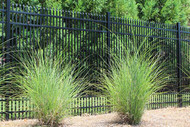Choosing the Right Height for Your Fence: A Practical Guide
Published by Online Fence Store on Nov 20th 2023
When it comes to selecting the perfect fence for your property, one of the critical factors to consider is the height. The height of your fence not only plays a significant role in defining the boundaries of your space but also contributes to the overall aesthetics, privacy, and security of your property. In this guide, we'll explore the various considerations that can help you choose the correct height for your fence.
- Purpose and Functionality
Before diving into the specifics of fence height, it's essential to clarify the primary purpose and functionality of your fence. Different properties have different needs, and understanding the purpose of your fence will guide you in making the right decisions.
- Privacy: If privacy is a top priority, especially in residential areas, consider a taller fence that provides a barrier from prying eyes. Six feet tall fences are commonly used for this purpose.
- Security: For security concerns, a taller fence can act as a deterrent to intruders. A fence with a height of six feet, topped with features like spear points or picket finials, adds an extra layer of security.
- Aesthetics: If your goal is to enhance the curb appeal of your property without necessarily emphasizing privacy or security, a lower fence may be appropriate. Four foot tall fences can create a boundary while maintaining an open feel.
- Pet Containment: For pet owners, especially those with larger dogs, a fence height of at least four to six feet is recommended to prevent pets from escaping.
Local Zoning Regulations
Before finalizing your decision on fence height, it's crucial to check local zoning regulations and homeowners' association rules. Many areas have specific guidelines regarding the maximum height allowed for fences, especially in residential neighborhoods. Failure to comply with these regulations may result in fines or the need to modify your fence, so it's best to be informed from the start.
Relationship with Neighbors
Consider your relationship with neighboring properties when determining fence height. Communication is key – discussing your plans with neighbors can help avoid potential conflicts. If your fence will significantly impact their views or sunlight, finding a compromise on the height can lead to a more harmonious neighborhood.
Sloping Terrain
If your property has uneven terrain, the height of the fence may vary along its length. It's essential to account for the slope and adjust the fence height accordingly to maintain a consistent barrier.
Local Climate and Wind Conditions
In regions prone to strong winds or severe weather conditions, the height of your fence can affect its stability. Taller fences may be more susceptible to wind damage, so it's crucial to choose a height that balances your needs with the local climate.
Selecting the correct height for your fence involves careful consideration of the intended purpose, local regulations, neighbor relationships, and the unique features of your property. By taking these factors into account, you can ensure that your fence not only meets your specific needs but also enhances the overall functionality and aesthetics of your outdoor space.



